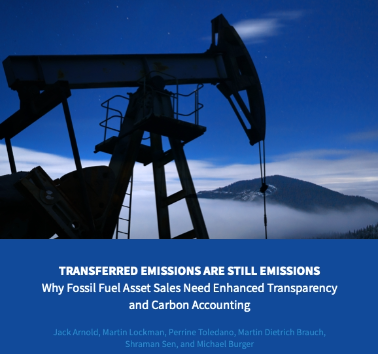Transferred Emissions Are Still Emissions: Why Fossil Fuel Asset Sales Need Enhanced Transparency and Carbon Accounting
It has been well documented that the “Oil Supermajors”—BP, Chevron, ConocoPhillips, Eni, ExxonMobil, Shell, and TotalEnergies—are selling off upstream fossil fuel assets.
As they do so, they offload emissions of carbon dioxide and other greenhouse gases (GHG) from their corporate reports, and their focus turns away from strategies that actually reduce emissions. Worse, the buying companies may increase the emissions associated with the assets, thereby worsening climate outcomes. That is why we need to track and monitor the sale of producing assets and the emissions attributable to those assets even after they are sold.
The transfer of emissions through asset sales may become increasingly common as the supermajors’ emissions come under increasing scrutiny and investors apply more pressure on them to reduce emissions.
CCSI and the Sabin Center for Climate Change Law have published a new report calling for increased transparency in the sale of fossil fuel assets by oil and gas companies. Read the full report:
The report assesses the regulatory landscape governing the corporate disclosure of fossil fuel asset sales, outlines the scale of fossil fuel asset sales by the supermajors, and proposes regulatory reforms to enhance transparency around fossil fuel asset sales by oil and gas companies.
Emissions transparency is not an end in itself, and emissions accounting alone cannot halt climate change. Our report shows that transparency, subject to continual improvement, is a necessary tool for the goal of limiting global warming to 1.5°C above pre-industrial levels.
Policymakers and regulators can mandate adjustments to corporate emissions accounting practices, or, preferably, the tracking of asset- and jurisdiction-specific emissions and the inclusion of upstream fossil fuel assets in existing greenhouse gas inventories.
Our recommendations can address known limitations of traditional corporate carbon footprinting approaches, close the gaps in corporate emissions disclosures frameworks and practices, and create incentives for oil and gas companies to redirect efforts towards real global emissions reductions, including through asset retirement.
Citing the above publication, UNCTAD’s World Investment Report (WIR) 2023 also examines the problem of transferred emissions, calling for a new model of dealmaking aligned with global net-zero targets.
At UNCTAD’s 8th World Investment Forum (WIF) in October 2023, CCSI and UNCTAD co-hosted a session discussing transferred emissions: Toward Guidelines for Responsible Sales of Upstream Fossil Fuel Assets. In partnership with the Sabin Center for Climate Change Law, CCSI proposed for discussion among policymakers and other stakeholders at the WIF the Draft International Principles on the Regulation of Transactions Involving Oil and Gas Infrastructure Assets. CCSI’s annotated version of the Draft Principles includes references and resources pertaining to each of the proposed principles.
Read here the slide decks presented by CCSI at the WIF session: the scene-setting presentation on transferred emissions based on the report above and the presentation summarizing the Draft International Principles launched at the session.

